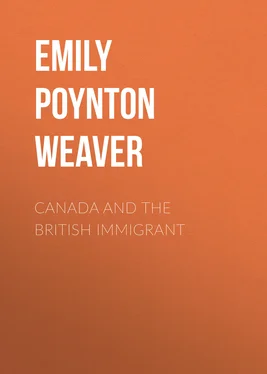Emily Poynton Weaver - Canada and the British immigrant
Здесь есть возможность читать онлайн «Emily Poynton Weaver - Canada and the British immigrant» — ознакомительный отрывок электронной книги совершенно бесплатно, а после прочтения отрывка купить полную версию. В некоторых случаях можно слушать аудио, скачать через торрент в формате fb2 и присутствует краткое содержание. Жанр: Путешествия и география, История, foreign_edu, foreign_antique, foreign_prose, на английском языке. Описание произведения, (предисловие) а так же отзывы посетителей доступны на портале библиотеки ЛибКат.
- Название:Canada and the British immigrant
- Автор:
- Жанр:
- Год:неизвестен
- ISBN:нет данных
- Рейтинг книги:3 / 5. Голосов: 1
-
Избранное:Добавить в избранное
- Отзывы:
-
Ваша оценка:
- 60
- 1
- 2
- 3
- 4
- 5
Canada and the British immigrant: краткое содержание, описание и аннотация
Предлагаем к чтению аннотацию, описание, краткое содержание или предисловие (зависит от того, что написал сам автор книги «Canada and the British immigrant»). Если вы не нашли необходимую информацию о книге — напишите в комментариях, мы постараемся отыскать её.
Canada and the British immigrant — читать онлайн ознакомительный отрывок
Ниже представлен текст книги, разбитый по страницам. Система сохранения места последней прочитанной страницы, позволяет с удобством читать онлайн бесплатно книгу «Canada and the British immigrant», без необходимости каждый раз заново искать на чём Вы остановились. Поставьте закладку, и сможете в любой момент перейти на страницу, на которой закончили чтение.
Интервал:
Закладка:
This kind of thing gives a curious interest to life in Canada. No doubt it is akin (on a smaller scale) to the spirit of expectancy and readiness for adventure which reigned in Europe in the years immediately following the discovery of America.
But it has been proved over and over again that the gifts of the wilderness are only to be won at great cost of toil, and struggle, and loneliness; and few men or women are cut out for the rôle of pioneer. In Canada hundreds of people every year venture to undertake tasks for which they are not fitted either by knowledge or previous experience or natural tastes, and the result is a vast amount of unnecessary suffering and disappointment, and often loss of health and even life; but I shall have more to say on this matter when dealing with the subject of the opportunities for immigrants. Here I would only add that there are numerous openings for people willing to work in the more settled communities as well as on the very frontiers of civilization; and that Canada has a great variety of opportunities to offer on easier conditions than actual pioneering.
If any one is attempting to obtain a true idea of the resources and opportunities of the Dominion, he should be very particular to bear in mind exactly what part of the country his informant is discussing. It is so large a country that persons talking loosely of what there is or is not “in Canada,” though their remarks may be perfectly accurate with regard to one district, may be totally misleading with regard to another. For example, in the Eastern Provinces, ivy and holly and broom are never seen growing in the open air, though the first-mentioned plant is often grown in pots as a house plant; but in Vancouver and Victoria ivy-covered buildings are as common as in England, and so are hedges and bushes of glossy holly. It is the same in matters other than vegetation. There are differences of manner and custom in different localities. French Canada is a quaint old-world land—how old-world the visitor must penetrate into the country to discover. But the “habitants,” speaking their French patois, scarcely differ more in many of their characteristics from the “go-ahead” English-speaking “Westerners” and the stalwart Nova Scotian fishermen, than do these two latter types differ from each other. You may find that your copper coins will not pass current in a new prairie town, but even a little further east a “cent” will buy a few things, including an enormous morning newspaper, excepting on the train.
It is not indeed surprising that there are many cases in which you cannot judge fairly or accurately of one place by another two thousand miles or more distant, even if both happen to be in Canada. Perhaps, indeed, one of the most general characteristics of the country is what some people might call its incongruities. Take a few instances at random. Canada has cities, where its richer folk live in luxury, and its poorest inhabit genuine slums (more’s the pity). It has, too, small villages and backwoods settlements and country communities, where class distinctions are of little account. In some towns you may see a smart up-to-date motor car, cheek by jowl with an ox wagon. It has a goodly list of well-equipped hospitals, but there are many remote settlements where a doctor is hardly to be had in direst emergency for love or money.
The observation that is true in some well-settled districts may not hold in the depth of its unbroken unexplored woods. One may know “Canada” as a land of quiet hills and valleys, but perhaps the name stands to his brother for a “sea of mountains,” with hundreds of “unconquered peaks” luring the Alpine climber to triumph or disaster. It may be that your Canada is the wide, open prairie country far inland, beautiful in its season, with a wealth of bright flowers or square miles of waving wheat; while the name for me means a rugged coast, where the great Atlantic rollers beat on cliffs of granite, or toss the white-sailed fishing boats in too-rough jest or fury.
“Canada” means all these things and many more. Its life is too complex, its resources too various to be presented satisfactorily in a single sketch; and yet behind all diversity the name does stand for a real unity and a growing national consciousness.
III
CONFEDERATION
NOW and for many a year past the whole vast country has been under one government, and this is a fact that is of a good deal of importance outside merely political circles. Unlike the Federal Government of its great neighbour, the several states of which united to resist pressure from the mother country without, “Confederation” in the case of the Dominion resulted largely from troubles within the provinces.
After the rebellion of 1837-38, the two provinces of Upper and Lower Canada were united under one government, with one legislature in which, though the population of the latter province was considerably larger than that of the former, each province was represented in the House of Assembly by forty-two members elected by the people, and in the Legislative Council by ten councillors appointed for life by the governor. The French naturally objected to this arrangement. They also objected to the assumption by the new province of the debts of both older ones, when the debt of Lower Canada was much smaller than that of Upper Canada; for, though part of the debt of the latter had been incurred in making canals and other improvements likely to be of advantage to the country generally, the French Canadians had, of course, never been consulted about the spending of the money.
In process of time, however, the relative position of the uneasily-yoked-together provinces altered.
In 1853 a bill was brought in, increasing the number of members of the Assembly from forty-two for each province to sixty-five. By this time the population of Upper Canada had outstripped that of the Lower Province, and there arose a demand amongst the English-speaking people for representation in proportion to population.
It is not surprising that the French Canadians, who had at first been the party to suffer by the forced equality of membership, resented and resisted the agitation for “Rep. by Pop.,” as it was often called. At that time it seemed as if the long-desired boon of responsible government were going to prove a failure in Canada, for the representatives of the people were split up into so many different groups—French and English; Reformers and Conservatives, both moderate and extreme, none of whom could arrive at any means of working harmoniously together. Any one of the numerous parties, standing alone, was sure to be outvoted; and it sometimes happened that opponents would unite to drive a third party from power, but not to give strength to any government.
The rivalry between the representatives of the French and English provinces was most dangerous to the principle of responsible government, for it could, and did happen, that measures affecting only one of the provinces were forced upon it by a majority drawn chiefly from the other province; and this caused very bitter and angry feeling. For instance, in this way a number of separate public schools for the Roman Catholics were firmly established in Upper Canada. Some people asserted, therefore, that it was the duty of a government to resign office if outvoted on a particular measure by the representatives of the province chiefly concerned, even though the majority of the whole House might be with it.
Another grave difficulty was that it led to grievous waste of the public money, for if money were voted for some public work in one province, an equal amount, whether needed or not, was usually voted for the other. These complications absolutely paralysed the working of the system of Party Responsible Government. Ministers rose and fell; dissolution of parliament succeeded dissolution; but there was no sign of any end to the confusion.
Читать дальшеИнтервал:
Закладка:
Похожие книги на «Canada and the British immigrant»
Представляем Вашему вниманию похожие книги на «Canada and the British immigrant» списком для выбора. Мы отобрали схожую по названию и смыслу литературу в надежде предоставить читателям больше вариантов отыскать новые, интересные, ещё непрочитанные произведения.
Обсуждение, отзывы о книге «Canada and the British immigrant» и просто собственные мнения читателей. Оставьте ваши комментарии, напишите, что Вы думаете о произведении, его смысле или главных героях. Укажите что конкретно понравилось, а что нет, и почему Вы так считаете.


![О Генри - Граф и свадебный гость [Черное платье] [The Count and the Wedding Guest]](/books/405331/o-genri-graf-i-svadebnyj-gost-chernoe-plate-th-thumb.webp)









